Turn off Windows 10 updates, 9 ways to completely block Windows 10 updates
On Windows 10, Microsoft no longer integrates the option to turn off updates completely, but the update process will take place automatically. Now to turn off Windows 10 updates, block Windows 10 from automatically updating or turn off the self-updating feature on Windows 10, you will have to do it manually.
For most users, Windows Update will slow down the system, can cause incompatibility errors, and when you need to turn off the computer, you have to wait for Windows to update for a long time and get frustrated. Below TipsMake.com will guide you. Show you how to turn off the automatic update feature on Windows 10! Because Windows 10 continuously updates, if method 1 doesn't work, try methods 2, 3.
1. Turn off updates on Windows 10 using services.msc
I always use this method to turn off Windows 10 updates. I have tested it on Education and Pro versions and both are OK, but it has disadvantages as I will mention below. You should do it in combination with method number 2 for the best results.
To turn off updates on Windows 10, follow these instructions:
Step 1: Press Windows+R to open run > type services.msc > press Enter or press Windows+E and paste the following path into the path bar:
Control PanelAll Control Panel ItemsAdministrative Toolsservices 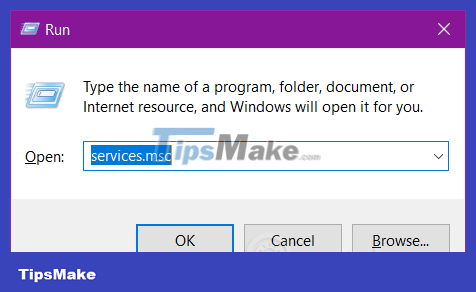
Step 2: Find the Windows Update section (scroll down to the bottom), double-click it to open the Properties window.

Step 3: At the General tab , click Stop under Service status , then find Startup type > click the arrow in the box and select Disabled .

Step 4: Click OK to save changes, restart the computer and check the Windows Update feature again.

Note: If you do this, Windows Defender cannot be updated anymore. It will be quite dangerous if your computer does not have any anti-virus software installed for Windows. If you just want to delay updating Windows 10 in the Startup Type section , you can choose Manual to update manually (it will notify you that there is an update available, but you have to click to install it yourself) or choose Automatic (Delayed Start) to wait until it's ready. If there is a complete update, please choose it. Windows 10 will then allow you to postpone updates for 3 days at a time, and every 3 days you can choose to postpone again.
On Windows 10 Pro and Education, some people reported that method 1 doesn't work, it still updates itself. I tried combining method 1 with method 2 below and it worked fine. If you encounter a similar situation, you should also do method 2.
2. Turn off Windows 10 updates using Group Policy Editor
To turn off the automatic update feature on Windows 10 , follow the steps below:
- Open Group Policy Editor, press Windows key + R to open the Run command window, then enter gpedit.msc there and press Enter . If you are using Windows 10 Home, you may not be able to find Group Policy Editor, please follow method 1 or .
- On the Group Policy Editor window, navigate to the key:
Computer Configuration > Administrative Templates > Windows Components > Windows Update- Find Configure Automatic Update , double click on it and select Disabled, then save the changes and you're done.
 How to turn off Windows updates using Group Policy Editor
How to turn off Windows updates using Group Policy Editor
You can watch how to turn off Windows 10 updates in the animation below:

3. Use EaseUS Tools M to block Windows 10 updates
If you want to block Windows 10 updates with just one click, you can try the free tool EaseUS Tools M. This tool allows you to enable/disable Windows Update, fix hard drive errors, erase/reactivate write-protection… in seconds.
The steps are as follows:
- Download EaseUS Tools M and install it on your computer. This tool has been tested by TipsMake.com on Virus Total and does not detect viruses
- To install EaseUS Tools M, just double-click the
toolsm.exedownloaded file, then click Next and wait to click Finish .
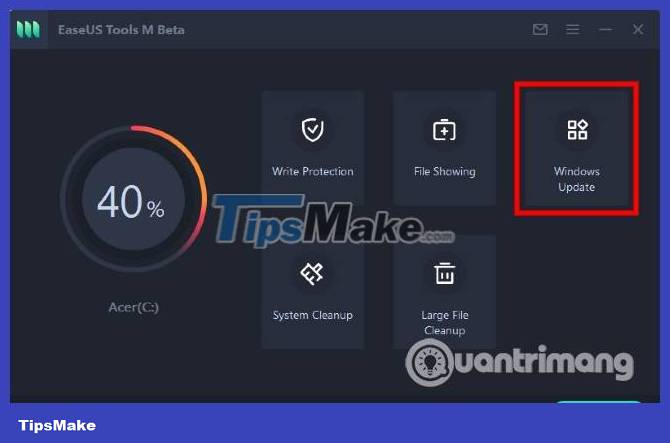
- Next, run EaseUS Tools M and access Windows Update
- The tool will automatically detect the status of the Windows Update service. If Windows Update is enabled, click Disable to block updates
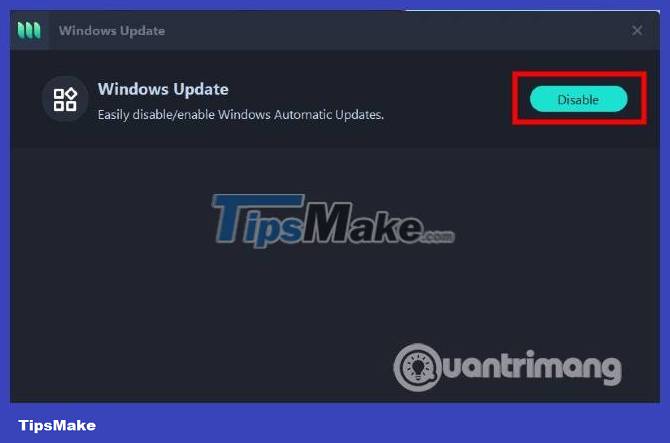
- To check if EaseUS Tools M actually works or not you can press the Windows button then type Services . Right-click Services and select Run as administrator
- In the list of services, find and right-click Windows Update then select Properties . You will see that this service is stopped

You can also use EaseUS Tools M to clean your computer. This tool supports deleting junk files and temporary files to free up space and speed up your computer. In addition, it can also help you search and delete large files. Other features of EaseUS Tools M include hard drive error repair, erase/enable write-protection.
4. Block Windows 10 updates for 365 days
In the Registry on Windows 10 1803, 1809, 1903, 1909 and 2004, there is an option that allows you to choose the specific version of Windows you want to use. That is, you can modify the Registry and have your device use a specific version of Windows 10, as long as that version is supported by Microsoft.
Additionally, the 'TargetReleaseVersionInfo' entry in the Registry also allows users to disable downloading of feature updates for up to 365 days. If you want to use a specific version of Windows 10, you can follow these steps to change the Registry:
- Press Windows + R , enter regedit .
- Navigate to
HKEY_LOCAL_MACHINESOFTWAREPoliciesMicrosoftWindowsWindowsUpdate- Right click on ' Windows Update '.
- Select ' New '.
- Select ' DWORD (32-bit) Value ' name it TargetReleaseVersion .
- Set the value of ' TargetReleaseVersion ' to 1 .
- Right click on the ' Windows Update e' folder again.
- Select ' New ' and click ' String Value '.
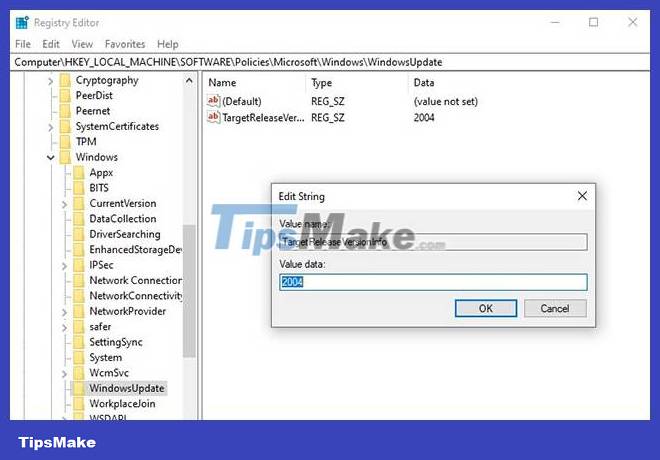
- Name it ' TargetReleaseVersionInfo ' and enter the Windows 10 version number as the value.
You can also enable this feature using PowerShell. To defer updates using PowerShell, run the command with the following syntax:
reg add HKLMSOFTWAREPoliciesMicrosoftWindowsWindowsUpdate /f /v TargetReleaseVersionInfo /t REG_SZ /d XXXXIn the command syntax above, you need to replace 'XXXX' with the version of Windows 10 you want to continue using.

This feature will be very useful when a new update is forced to install on your device, or you have to delay the update to upgrade your device. For example, if you are on version 1903 and do not want to upgrade to version 2004, you can enter the value '1903', to stay on version 1903, or enter '1909', to be updated to version 1909.
5. Block Windows 10 updates in regedit
Enter regedit in the search box, press Enter to open the registry window. Copy and paste the following link into the address bar right under the File|Edit|View|Favorites|Help menu:
HKEY_LOCAL_MACHINESoftwarePoliciesMicrosoftWindowsWindowsUpdateAU 
Double click NoAutoUpdate , in Value data , enter 1 and then click OK as shown:
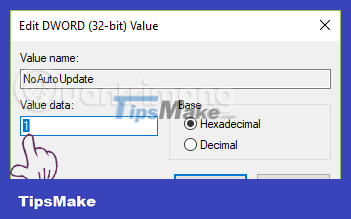
After completion, the value of NoAutoUpdate will appear as 0x00000001(1). If you want Windows 10 to update automatically again, change the Value data value in the step above to 0.
6. Pause Windows Update on Windows 10 via Settings
This way to turn off Windows 10 updates is only temporary, allowing you to postpone the update to a more suitable time, without turning off the update completely. The maximum postponement period is about 30 days each time.
Enter Windows Update settings in the search bar.
The Windows Update interface opens, find Advanced options :
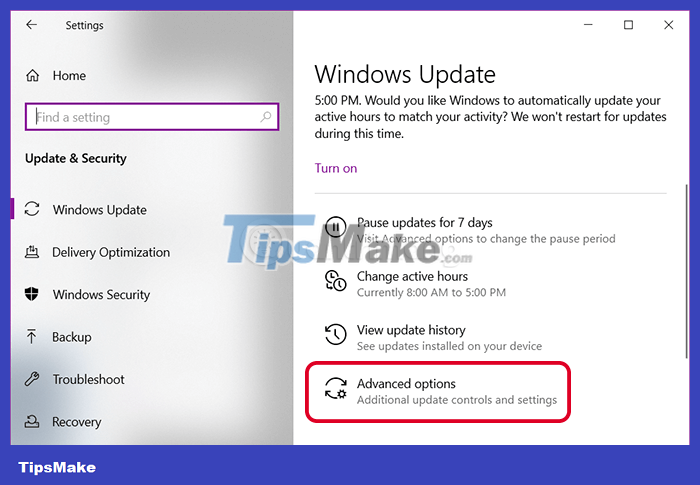
Find Pause updates > Pause until > select the date you want to update Windows 10.
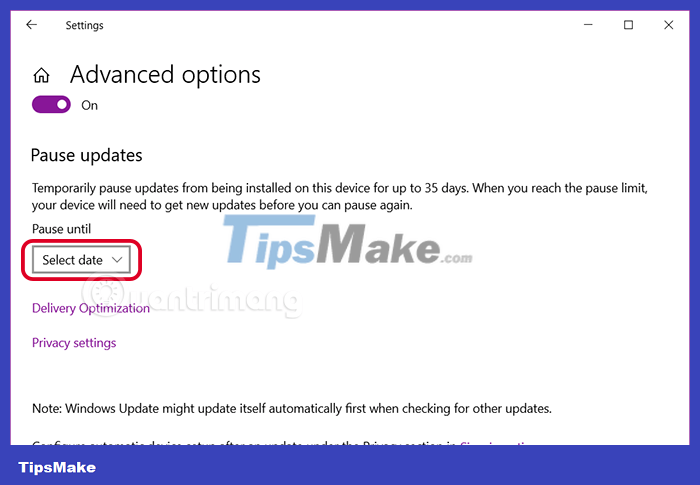
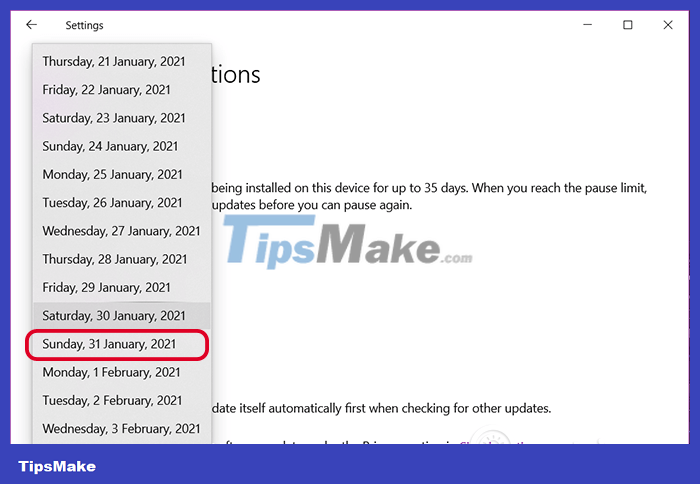
Then returning to the Windows Update interface, you will see a notification that the update has been postponed to the date you selected as successful:

7. Turn off Windows 10 peer-to-peer updates
Another fairly new feature in Windows 10 is the system that allows updates via peer-to-peer (p2p) computers. To put it simply, when updating, one computer will be considered the "host" computer, and other peer computers will update through that "host" computer. This will help users save bandwidth, and updates will also be faster than downloading directly from the Internet. And to turn off this type of update, click on the Choose how updates are delivered link :
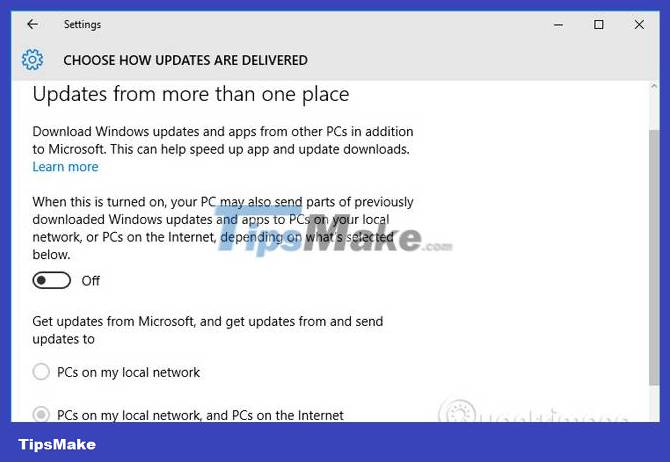
Switch On mode to Off.
8. Postpone updates on Windows 10
This method takes advantage of the Metered Connection feature, which only applies when you use a wifi network. Simply put, switching your Wifi network to a data-restricted network will cause Windows 10 to delay updates until you switch to an unrestricted network.
To enable the Set as metered connection option , follow these steps:
1. On your Windows 10 computer, open the Start Menu.
2. Go to Settings .
3. When the Settings window opens, click Network & Internet .
4. Click on Wi-Fi in the left pane.
5. Now click Manage known networks.
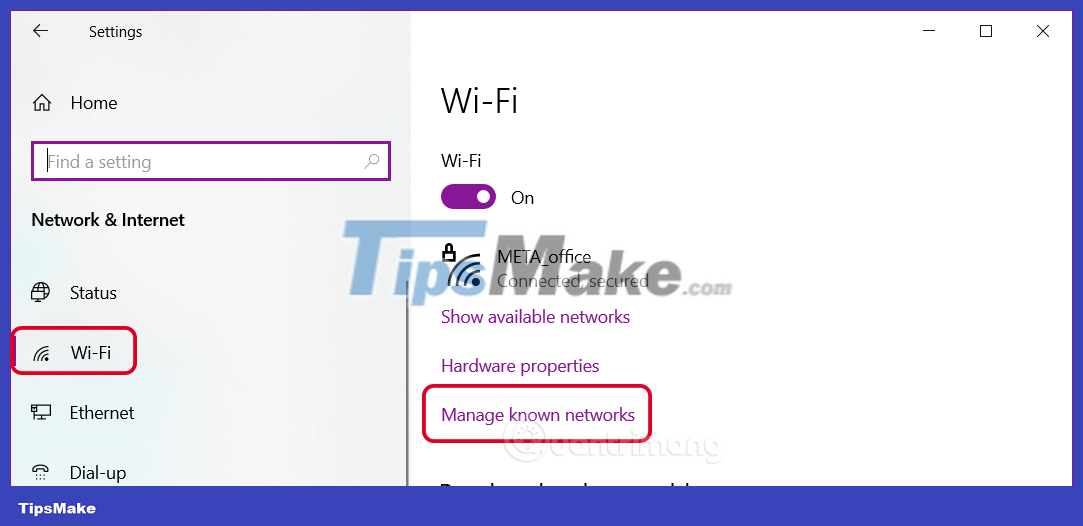
6. Click on the wireless connection name > click the Properties button .
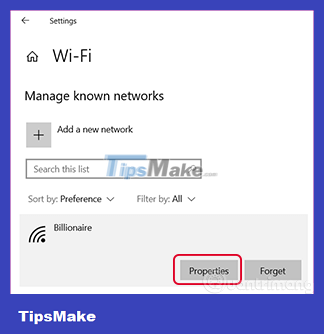
7. Now, scroll down to find the Metered Connections heading.
8. Then turn on the Set as metered connection button .
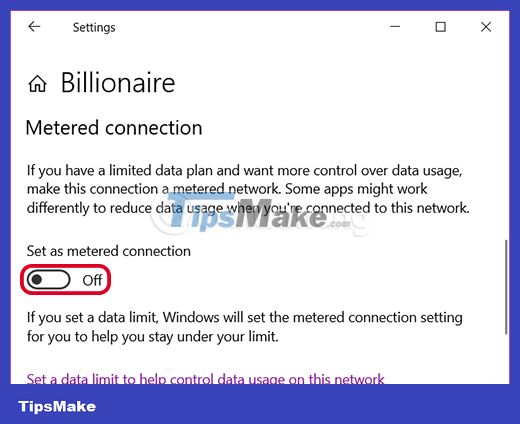
This way, you can pause Windows 10 updates for a while in case you run out of monthly usage.
9. Block specific Windows 10 updates
On the Windows website there is a "show or hide updates" tool that allows users to disable or hide specific Windows 10 updates. You just need to download this tool and install it. Follow the instructions and disable problematic updates.
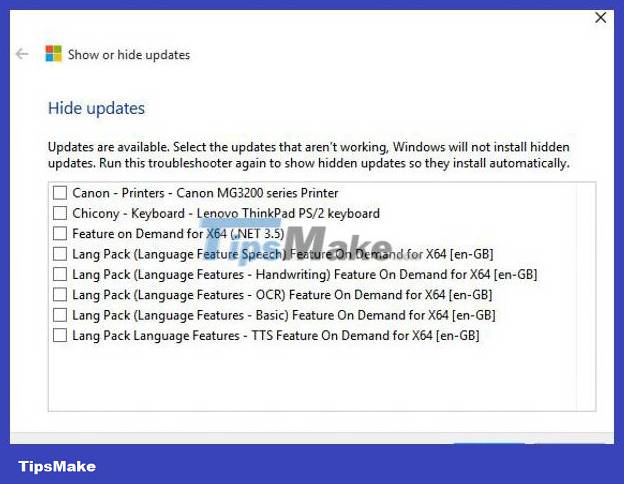
12. Use Microsoft's Show or Hide Updates tool
Few people know that Microsoft also provides a tool called Show or Hide Updates to allow you to customize how Windows 10 handles updates. This tool is quite easy to use, you just need to download, run and follow the steps below:
Step 1 : Download the Show or Hide Updates tool .
Step 2 : Run the tool and click Next to let the tool scan for updates waiting to be installed.
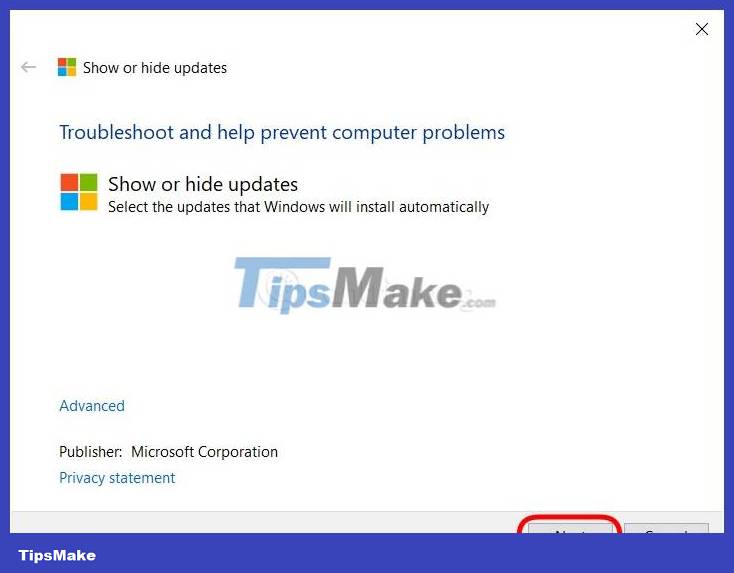
Step 3 : Click Hide Updates to continue.

Step 4 : Here, you will see a list of updates that you can block. Click on the updates you want to block. After selecting, click Next.

Step 5 : The tool will need some time to hide the updates selected at your discretion. Hidden updates will no longer be installed on your Windows 10. After configuration is complete, the tool will say Fixed next to hidden updates as shown below.

So you have finished blocking Windows updates using the Show or Hide Updates tool. When needed, you can use the Show updates function to show hidden updates.
12. Turn off Windows 10 Update using settings in Settings
You can also disable Windows Update by configuring Settings on Windows 10. This method is simple but has the disadvantage of not being able to completely turn off the automatic update feature of Windows 10. Basically, it can help you. Install so that Windows notifies you when an update is available so you can decide whether to install it or not.
The steps are as follows:
Step 1 : Press Win + I to open Settings.
Step 2 : Click Update & Security.
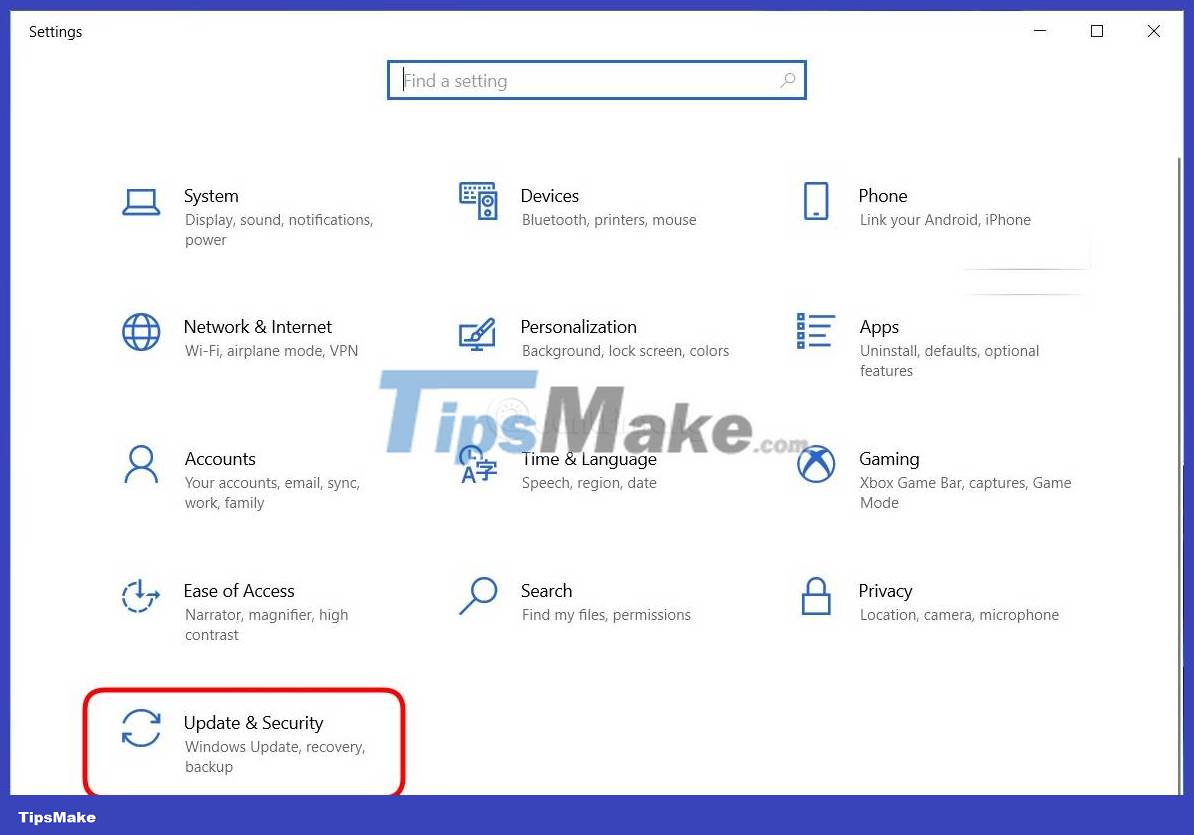
Step 3 : Click Advanced options.
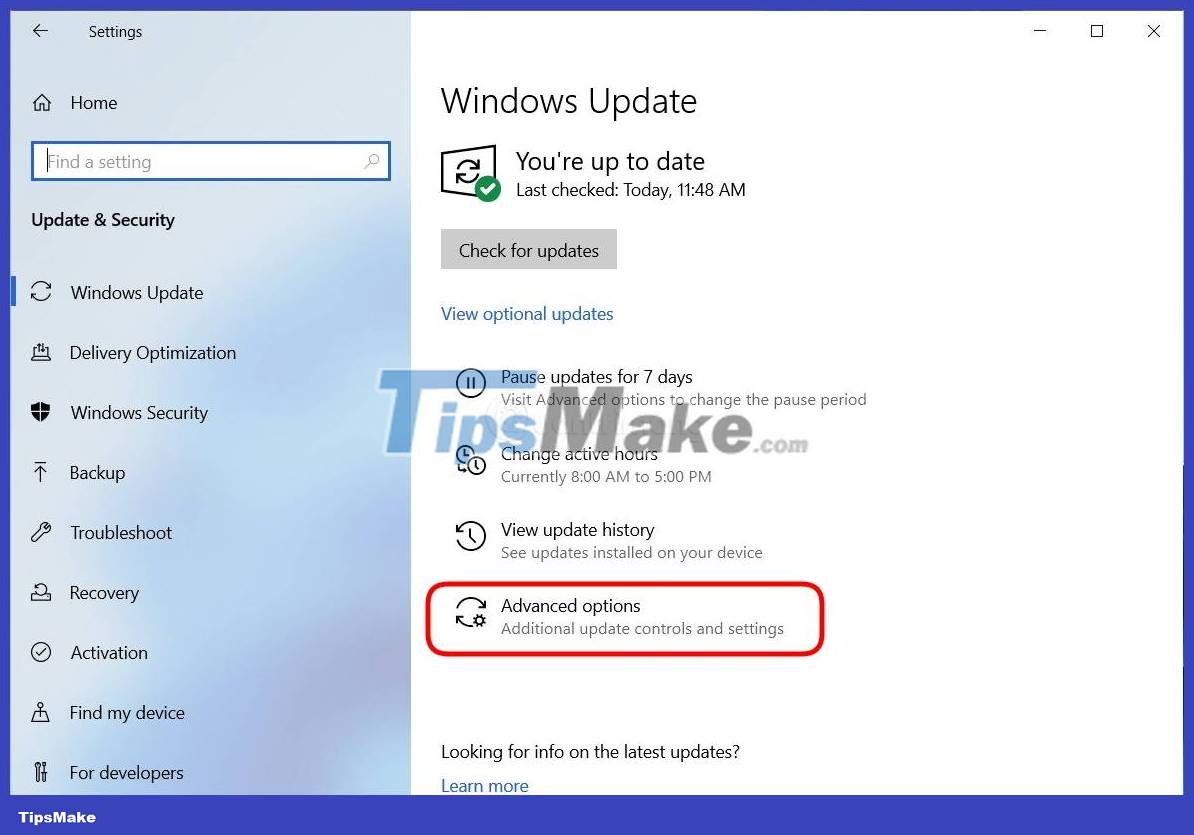
Step 4 : Switch the selector button in the first three lines to Off mode .
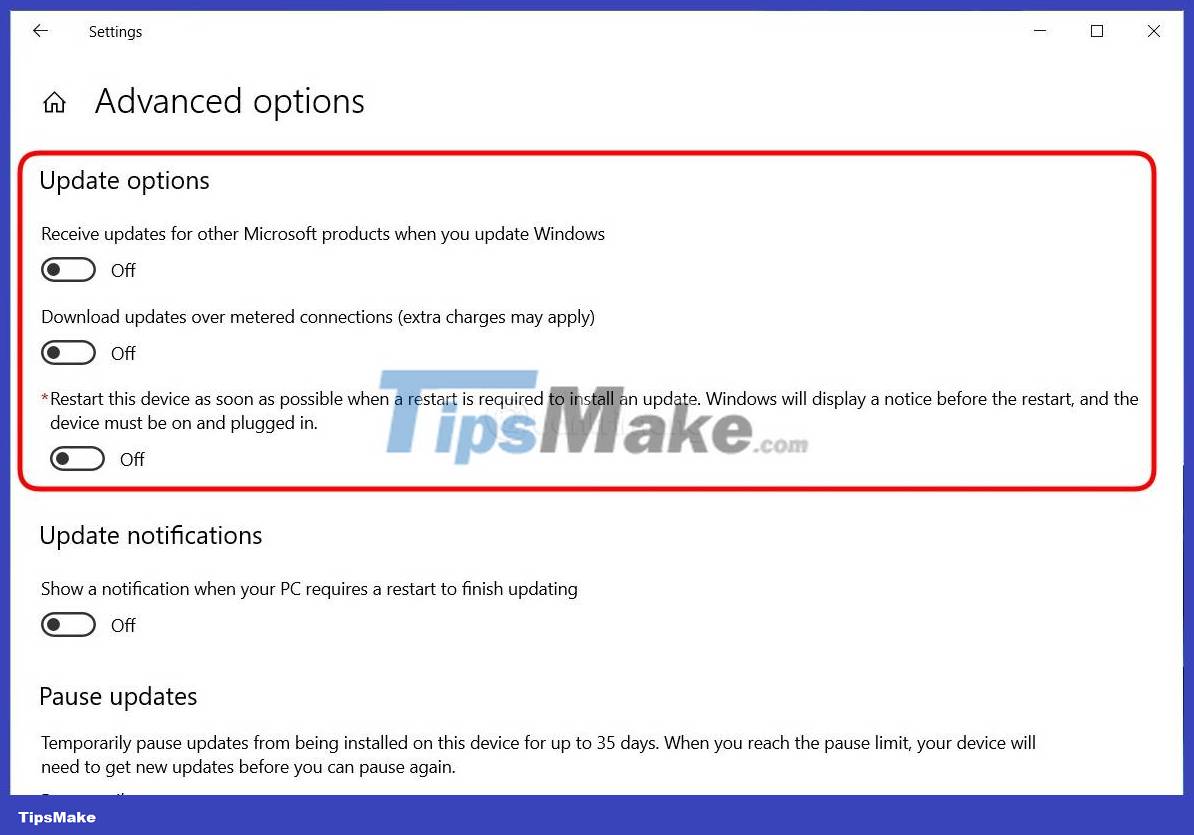
That's it, wish you success!
13. How to block Windows 10 from updating to Windows 11
Now, when Windows 11 is released and exists in parallel with Windows 10, in addition to the need to turn off Windows 10 updates, many users also want to block Windows 10 from updating to Windows 11. There is no way to block Windows 10 from updating to Windows 11. What's complicated, you can do it easily by following these steps:
Method 1: Use Regedit Editor
Step 1: Press Windows + R to open Run then type regedit and press Enter.
Step 2: In Registry Editor , find the following key:
ComputerHKEY_LOCAL_MACHINESOFTWAREMicrosoftWindowsUpdateStep 3: Right-click on the right-hand space then select New > DWORD (32-bit) Value and name this value TargetReleaseVersion and assign it a value of 1 .
Step 4: Right-click on the right-hand space then select New > String Value and name this value TargetReleaseVersionInfo and assign it the value 21H1 .
Step 5: Restart the computer for the changes to be applied. If you need to update to Windows 11, you just need to delete the two values TargetReleaseVersion and TargetReleaseVersionInfo and you're done.
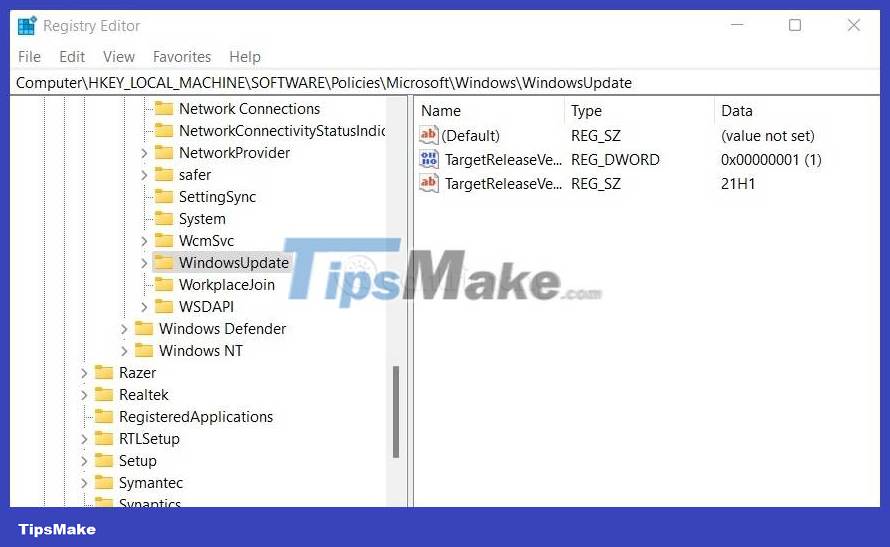
Method 2: Use Group Policy
If you use Windows 10 Pro, you can also use Group Policy to block updates to Windows 11. Go to Local computer policy > Computer configuration > Administrative models > Windows components > Windows update > Windows Update for Business . Next, double-click Select the target feature upgrade version , select 21H1 and click OK then restart the computer.

To continue updating to Windows 11, you just need to repeat the above steps but select 21H2 instead of 21H1.
Refer to some more articles below:
Good luck!
You should read it
- ★ Steps to turn off Windows 11 Update, How to stop updating Windows 11
- ★ Why should you never turn off automatic application updates on your phone?
- ★ Instructions on how to turn off Self-Update notifications when you shutdown on Windows 10
- ★ How to turn off Windows 10 update to avoid automatic updates?
- ★ How to turn off Update Windows 10 thoroughly